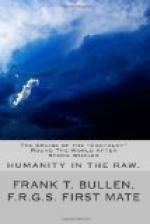Their situation was pitiable in the extreme. During the years of peace and serenity they had spent here, no thought of the insecurity of their tenure had troubled them. Though they had but been dwellers on the threshold of the mountain, as it were, and any extension of their territory impossible by reason of the insurmountable barrier around them, they had led an untroubled life, all unknowing of the fearful forces beneath their feet. But now they found the foundations of the rocks beneath breaking up; that withering, incessant shower of ashes and scoriae destroyed all their crops; the mild and delicate air changed into a heavy, sulphurous miasma; while overhead the beneficent face of the bright-blue sky had become a horrible canopy of deadly black, about which played lurid coruscations of infernal fires.
What they endured throughout those days and nights of woe, could never be told. They fled from the home they had reared with such abundance of loving labour, taking refuge in a cave; for not even the knowledge that the mountain itself seemed to be in the throes of dissolution could entirely destroy their trust in those apparently eternal fastnesses. Here their eldest son died, worried to death by incessant terror. At last a passing whaler, remembering them and seeing the condition of things, had the humanity and courage to stand in near enough to see their agonized signals of distress. All of them, except the son buried but a day or two before, were safely received and carried away, leaving the terrible mountain to its solitude.
As I listened, I almost involuntarily cast my eyes upwards; nor was I at all surprised to see far overhead a solitary patch of smoky cloud, which I believe to have been a sure indication that the volcano was still liable to commence operations at any time.
So far, we had not happened upon any pigs, or goats either, although we saw many indications of the latter odoriferous animal. There were few sea-birds to be seen, but in and out among the dense undergrowth ran many short-legged brown birds, something like a partridge—the same, I believe, as we afterwards became familiar with in Stewart’s Island by the name of “Maori hens.” They were so tame and inquisitive that we had no difficulty in securing a few by the simple process of knocking them over with sticks. From the main branch of a large tree hung a big honey-comb, out of which the honey was draining upon the earth. Around it buzzed a busy concourse of bees, who appeared to us so formidable that we decided to leave them to the enjoyment of their sweet store, in case we should invite an attack.




